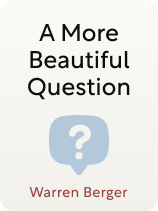
Do you have a lot of great ideas but struggle to execute them? What type of questions should you be asking in order to turn ideation into execution?
In A More Beautiful Question, Warren Berger urges us to ask important questions again as we did as kids. He discusses three “beautiful questions”—“Why?”, “What if?”, and “How?”. The “How” questions in particular have the power to help us capitalize on the creativity that the other questions produce.
Read more to learn why you should ask “How” questions.
Ask “How” Questions
To turn a creative idea into reality, you need to answer the third and final fundamental question: “How?” Berger says this is the most difficult step. To ask “How” questions and fully answer them often requires patience and commitment to your idea because the answers tend to be much more complicated than they seem at first.
For example, the rideshare app Uber came from a “what if?” question. Cofounders Garrett Camp and Travis Kalanick got stranded in a snowstorm in Paris, and they wondered: “What if you could use your phone to secure a ride?” But, that concept on its own was worthless—founding the rideshare company that made them billionaires first required them to answer how they were going to do that.
Furthermore, that answer (a relatively simple smartphone app) led to numerous other questions, as Berger says is likely to happen: For instance, how would they compensate the drivers? How could they make riding with strangers as safe as possible? How would they outcompete local taxi services? Fully answering these “how?” questions led Camp and Kalanick to found one of the world’s most successful startup companies.
| A Follow-Up Question: How Can You Best Leave Your Options Open? When Berger discusses answering a “how?” question, he’s arguably talking about making a plan: coming up with a series of actions and predicting their outcomes, with the ultimate goal of turning your “what if?” scenario into reality. That may be why answering “how?” is so much more difficult than it appears—instead of just answering one question, you’re undertaking a multi-step process that involves choosing a goal, determining how to reach that goal, and then doing it. However, thinking too hard about your “how?” can be counterproductive. In Antifragile, risk analyst Nassim Nicholas Taleb warns against relying too heavily on predictions and plans. He says the world is so complex that predicting events is nearly impossible: For instance, consider how unreliable long-term weather reports tend to be. Further, an incorrect prediction can cause your entire plan to fall apart. Therefore, another important question to ask is, “How can I protect this plan from unexpected events?” According to Taleb, the answer is to rely on options instead of predictions. Options protect you from the world’s uncertainty because, no matter what situation you’re in, you can choose the best option available at that moment. On the other hand, if you’ve created a strict step-by-step plan based on predictions, you become lost as soon as one of those steps doesn’t work the way you expected it to. For example, if you hire more employees based on a prediction of how quickly your company will grow but actual growth doesn’t match your projections, you stand to lose a lot of money. So, if you’re trying to start a business (such as Uber), Taleb would say you shouldn’t rent office space until you can’t proceed without it—it might turn out you don’t need a physical office at all. Similarly, don’t hire any employees until it becomes clear that the business has become too big to handle on your own. The money that goes to pay an employee’s salary might have been better spent on, say, speaking with a business consultant or covering unexpected overhead costs. |

———End of Preview———
Like what you just read? Read the rest of the world's best book summary and analysis of Warren Berger's "A More Beautiful Question" at Shortform.
Here's what you'll find in our full A More Beautiful Question summary:
- The three fundamental questions you should be asking every day
- How to develop a curious, questioning mindset
- How schools stifle curiosity rather than encouraging it






